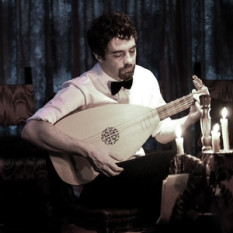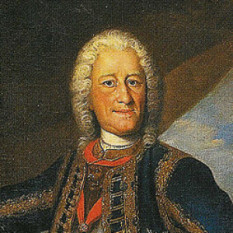Andreas Hammerschmidt (1611 or 1612 – October 29, 1675), the "Orpheus of Zittau," was a German composer and organist, of Bohemian birth, of the early to middle Baroque era. He was one of the most significant and popular composers of sacred music in Germany in the middle 17th century.
Hammerschmidt wrote motets, concertos and arias, and almost all of his output is sacred vocal music in the concertato style. According to Manfred Bukofzer (1947), he "watered down the achievements of Schütz for the multitude." Many of his compositions are in the form of the chorale monody, an adaptation of the early Baroque Italian form to a sacred, and specifically Protestant, purpose. Indeed Hammerschmidt represents the second generation of composers who distilled a native German Baroque tradition out of forms and styles imported from Italy.
Over 400 works by Hammerschmidt survive, in a total of 14 separate collections. The motets represent a more conservative style, as noted by Hammerschmidt himself, and the concertos—concertato pieces with opposing groups of voices and instruments—are in a current idiom.
Some of his concertos are written for large ensembles, with diverse combinations of instruments and voices (for example, the sets from Gespräche über die Evangelia of 1655–1656; this was long enough after the war that large ensembles were available again). He wrote these pieces for Sundays and church feast days; their structure and intent foreshadowed the later German church cantata, as exemplified most famously by Johann Sebastian Bach. Even Hammerschmidt's masses conform to the concertato style, and are best seen as concertos.
While Hammerschmidt was an organist all of his life, no organ music of his has survived; indeed there is no evidence he published any. Some instrumental music of his has survived in three publications; most these are suites of dances influenced by the English style which was prevalent in the northern part of Germany.
.
Anda boleh mendapatkan maklumat melalui enjin carian muzik terbaik - Muzlan.top 😊Semua bahan berdasarkan permintaan "Andreas Hammerschmidt" tersedia di halaman Andreas Hammerschmidt
Ya sudah tentu. Anda boleh mendengar lagu di halaman Andreas Hammerschmidt
Ya sudah tentu. Anda boleh memuat turun trek di halaman Andreas Hammerschmidt
Halaman ini dijumpai oleh pertanyaan: Andreas Hammerschmidt track minus, Andreas Hammerschmidt songs download, Andreas Hammerschmidt song listen, Andreas Hammerschmidt flac, Andreas Hammerschmidt mp3 download


